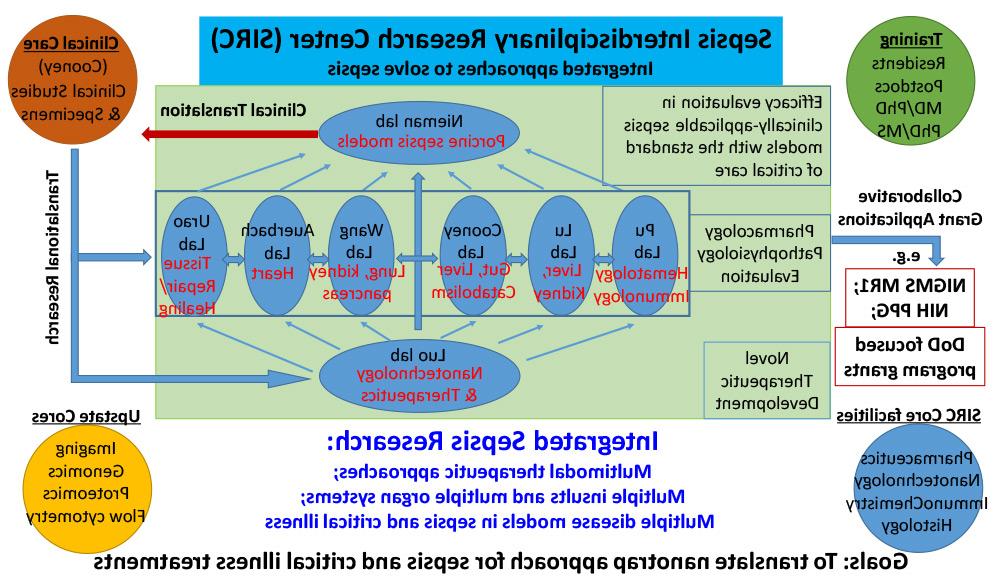SIRC Overview & Membership
全面的跨学科研究专业知识和多个资助的研究项目(四个NIH r01)在Upstate同时出现, with natural synergy for conducting collaborative and translational sepsis research. SIRC的成立将有力地促进这种合作,目标是将新技术和治疗方法转化为更好的败血症治疗. Eight research laboratories in the Departments of Surgery, 在脓毒症和危重疾病的炎症和器官损伤方面,药理学和医学一直与多个合作和转化研究项目密切合作.

Robert Cooney, MD, Professor and Chair of the Department of Surgery, 是一名获得外科重症监护委员会认证的普通外科医生,并有超过28年的脓毒症和器官衰竭重症患者的护理经验. 除了担任多项败血症和器官衰竭临床试验的PI外, 他也是美国国立卫生研究院资助的研究员,在败血症诱导的分解代谢方面有20多年的实验室研究经验, the gut and organ injury. Dr. Cooney has organized a multidisciplinary, 在败血症和器官损伤方面有重叠的研究兴趣.
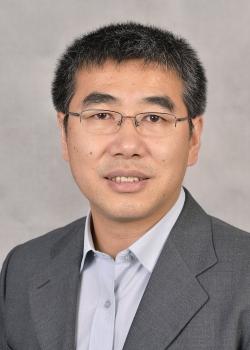
Juntao Luo, PhD, Associate Professor in the Department of Pharmacology and Department of Surgery (joint), 专注于疾病治疗的新治疗方法和纳米技术的发展. Dr. Luo has invented a novel, 定义良好的端突纳米平台,用于定制纳米载体的开发,以提供各种治疗药物, including small molecules, protein therapeutics and gene molecules. Further, Dr. Luo has transformed his drug-delivery nanoplatform into molecular traps in nanoparticle, nanogel, hydrogel and hydrogel resin, which can be used to delivery therapeutics, as well as to scavenge both insult molecules and mediators of inflammation, therefore, attenuating hyperinflammation in sepsis. Dr. 罗一直积极与SIRC的许多教师合作,将他的纳米技术应用于改善与败血症相关的危重疾病的治疗.
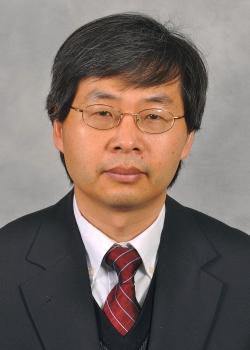
Guirong Wang, PhD, Professor in the Department of Surgery, 研究表面活性剂蛋白-A (SP-A)和-D (SP-D)调节宿主对感染反应的细胞和分子机制. Dr. Wang的NIH和nsf资助的实验室使用转基因SP-A和SP-D敲除和人源化转基因小鼠模型来阐明它们在肺炎诱导的败血症和器官功能障碍中的作用. Additionally, Dr. Wang has been closely collaborating with other SIRC groups in the past decade.

Gary Nieman, BA, Professor in the Department of Surgery, 已经建立了一种具有高度临床应用价值的由创伤性损伤和感染引起的猪脓毒症模型. 他的实验室已经将这种强大的败血症模型应用于评估预防肺损伤和其他器官衰竭的治疗方式已有20年了. 他和他的团队开发了一种创新的保护性机械通气策略,以降低败血症引起的ALI的发病率和死亡率, which is currently being used at Upstate in the ICU. Multiple federal grants have been awarded, e.g. R01, R21, DoD grants, SBIR awards, etc. 使用这种与临床相关的大型动物模型,它非常接近地模拟了临床ICU的所有组成部分. Nieman教授目前是NIH资助的PI,与佛蒙特大学和杜兰大学合作研究ALI中的保护性机械通气. In addition, 尼曼教授是罗彻斯特大学R01项目的共同研究员. Luo at Upstate.
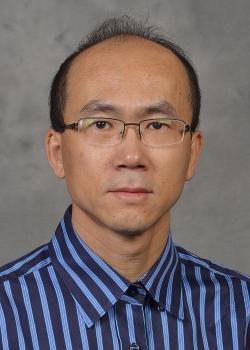
Hong Lu, PhD, Assistant Professor in the Department of Pharmacology, has been working on liver diseases and hepatic functions for more than twenty years. He has been collaborating with Dr. Luo in developing a liver-specific corticosteroid prodrug, funded by NIH grants, 保护肝细胞功能,改善抗炎反应,治疗酒精性和非酒精性脂肪肝及肝硬化, a major risk factor of sepsis. He has also been collaborating with Dr. 研究肝特异性缺乏和糖皮质激素受体的激活如何影响脓毒症的预后.

David Auerbach, PhD, Assistant Professor in the Department of Pharmacology, strives to advance the understanding of neuro-cardiac electrical disturbances. His arrhythmia research program is currently funded by American Heart Association. Dr. Auerbach’s research program complements the goals of this program, as he leads a multi-system and multi-disciplinary research program. He offers expertise in neuro-cardiac cellular, organ, in vivo, and clinical database research approaches, 这将使详细调查败血症对心功能的影响成为可能.
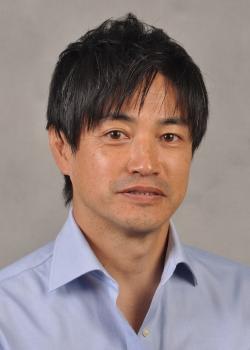
Norifumi Urao, MD/PhD, Assistant Professor in the Department of Pharmacology, with a NIH/R01 grant in tissue repair/healing, bone marrow response and innate immunity. As a research scientist with clinical experience in internal medicine and cardiology, Dr. Urao focus on gaining knowledge on ischemic organ injury. 主要研究方向为缺血性损伤后的伤口愈合/组织再生以及肥胖/糖尿病对免疫系统的长期影响.

Michaela (Mikki) Kollisch, MD, Assistant Professor of Pediatric Surgery, studies sepsis and lung injury with Professor Gary Nieman. With a background in Mathematics, she has been studying lung micromechanics in animal models of sepsis-induced lung injury. 她确定机械通气参数的细微变化导致肺泡和肺泡导管恢复的显著变化, shape, and distribution. 了解这些微观力学变化对于制定保护性机械通气策略至关重要,从而最大限度地减少呼吸机引起的肺损伤和由此产生的急性呼吸窘迫综合征.

Snehalata Pawar, PhD, Assistant Professor of Radiation Oncology, 研究电离辐射(IR)对正常组织(肠)辐射损伤的脓毒症.
暴露于全身辐射(如核弹爆炸或核事故期间或腹部放射治疗期间)的一个主要副作用是IR对快速更新的细胞系统(如骨髓(BM)和胃肠道(GI)粘膜)的急性毒性. Currently, there are no effective agents to prevent or treat IR-induced gut sepsis, 因此,描述脓毒症的细胞和分子机制对于开发未来的治疗方法至关重要.
她一直在研究辐射诱导的肠道损伤和败血症的分子机制,并将TLR4信号作为干预肠道炎症和亚硝化应激的潜在靶点. Dr. Pawar目前的研究考察了TLR4抑制在保护a)急性辐射诱导的肠道干细胞损伤和b)延迟辐射诱导的心脏损伤中的作用. 另一个正在进行的项目是研究一种小分子药物Myelo001在防止辐射引起的造血干细胞和祖细胞损伤中的作用.

